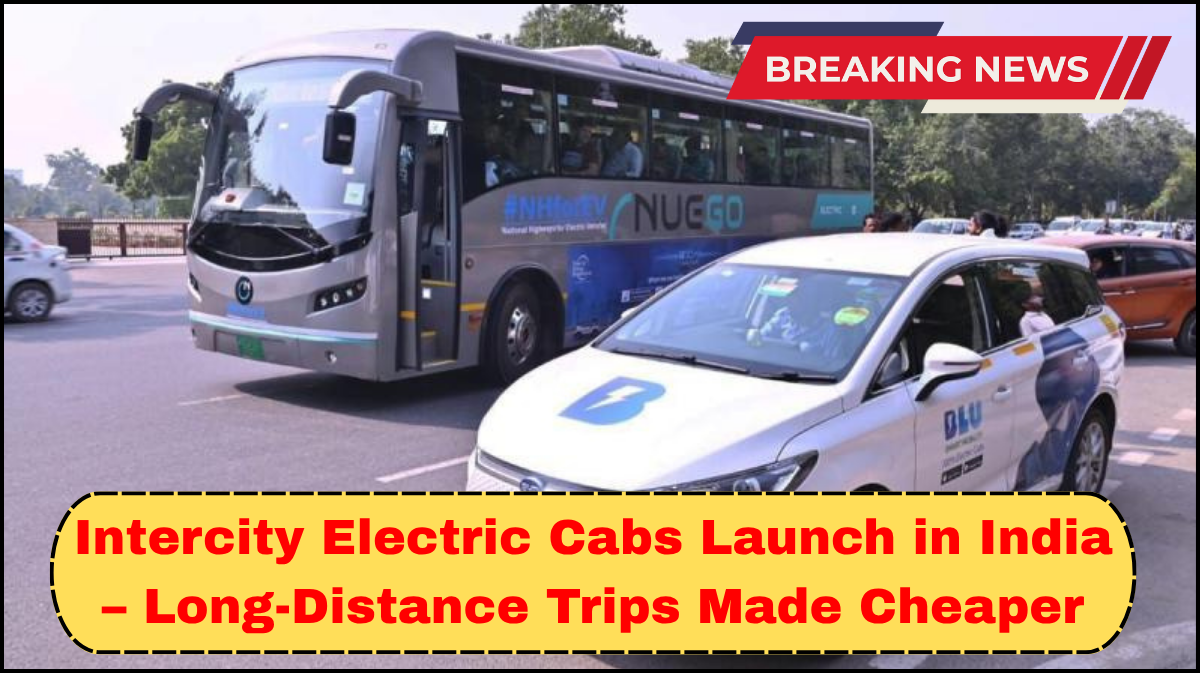India’s electric mobility sector just hit a new milestone with the launch of intercity EV cab services. As the nation shifts toward cleaner transportation, these electric cabs now offer travelers a smarter, more cost-effective way to take long-distance trips between cities. From reduced carbon footprints to significant cost savings, this development marks a transformative step in sustainable intercity travel.

What Are Intercity EV Cabs?
Intercity EV cabs are electric vehicles designed specifically for travel between cities. Unlike standard city-only electric taxis or intra-city ride-hailing services, these cabs are equipped for longer ranges and better highway performance. Typically, they include enhanced battery capacity, rapid charging capability, and spacious comfort features tailored for extended journeys.
The concept aims to replace traditional diesel and petrol-based intercity cabs with clean energy alternatives, offering a greener and more economical choice for both passengers and fleet operators.
The Push for Affordable Long-Distance Travel
One of the biggest selling points of intercity EV cabs is affordability. Thanks to significantly lower running costs compared to internal combustion engine (ICE) vehicles, EV operators can offer cheaper fares for long-distance routes. While fuel prices continue to fluctuate, electricity remains a more stable and economical power source.
For example, an EV typically consumes electricity worth ₹1.5–₹2 per kilometer, compared to ₹6–₹9 per kilometer for diesel vehicles. Multiply that over a 300 km trip, and the savings become substantial for both the service provider and the rider.
Key Players and Pilot Projects
Several startups and established ride-hailing companies are already piloting intercity EV cab services. Some notable initiatives include:
-
BluSmart: Known for its all-electric urban cab fleet, the company has now expanded into intercity routes connecting Delhi-NCR to cities like Chandigarh and Jaipur.
-
Lithion Mobility and Eversource Capital have invested in EV infrastructure and fleet expansion projects, aiming to support such services at scale.
-
State Transport Departments: Maharashtra and Karnataka have already shown support for intercity EV adoption through subsidies and EV charging corridor plans.
EV Infrastructure is Catching Up
The success of long-distance EV travel depends heavily on infrastructure. Recognizing this, governments and private players are accelerating the rollout of highway EV charging stations. The National Highways Authority of India (NHAI) plans to install charging points every 50 kilometers on major corridors.
Additionally, battery-swapping stations and solar-powered charging hubs are emerging as viable solutions for keeping fleets on the road with minimal downtime.
Environmental Benefits That Matter
Beyond economics, the environmental impact is significant. A single intercity EV cab can reduce greenhouse gas emissions by over 1.5 tons annually compared to its diesel counterpart. Considering the millions of intercity trips made daily in India, switching even a fraction of these to electric could have a major cumulative effect on air quality and fuel dependency.
Who Benefits from Intercity EV Cabs?
-
Commuters: Daily travelers between cities like Pune-Mumbai or Bengaluru-Mysuru can now choose a cleaner, quieter, and cheaper ride.
-
Tourists: With growing eco-consciousness, tourists are opting for low-emission travel options. EV cabs offer a hassle-free alternative to trains or self-drive rentals.
-
Fleet Owners: Lower operational and maintenance costs make EVs a smart long-term investment.
-
Governments: Reducing transport-related emissions helps India meet its climate commitments and reduce oil imports.
Challenges and the Road Ahead
Despite the excitement, some hurdles remain:
-
Limited fast-charging networks outside metro areas
-
Initial high purchase cost of EVs
-
Range anxiety for passengers unfamiliar with EV performance
However, with new EV models offering ranges above 300 km per charge and policy support including FAME-II subsidies, these challenges are quickly being addressed.
FAQs
Q1: Are intercity EV cabs safe for long-distance travel?
Yes. Modern EVs are built with high safety standards and equipped with GPS tracking, ABS, and regenerative braking systems, making them reliable for long trips.
Q2: How do I book an intercity electric cab?
Many providers like BluSmart, Uber Green (in select cities), and startup-led platforms offer bookings via mobile apps or dedicated websites.
Q3: What is the average range of an intercity EV cab on a full charge?
Most intercity EV cabs today offer ranges between 250–400 km, depending on the model and terrain.
Q4: Are there enough charging stations along major highways?
Yes, EV charging infrastructure is expanding rapidly, especially on major routes between metro cities. NHAI and private companies are adding fast-charging stations at regular intervals.
Q5: Is traveling by intercity EV cab really cheaper?
Absolutely. Lower energy and maintenance costs allow providers to offer more competitive fares compared to traditional diesel or petrol cabs.
click here to learn more